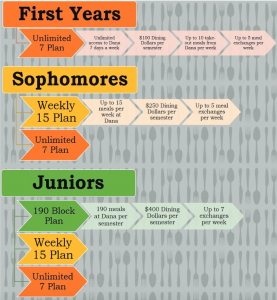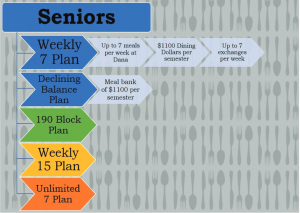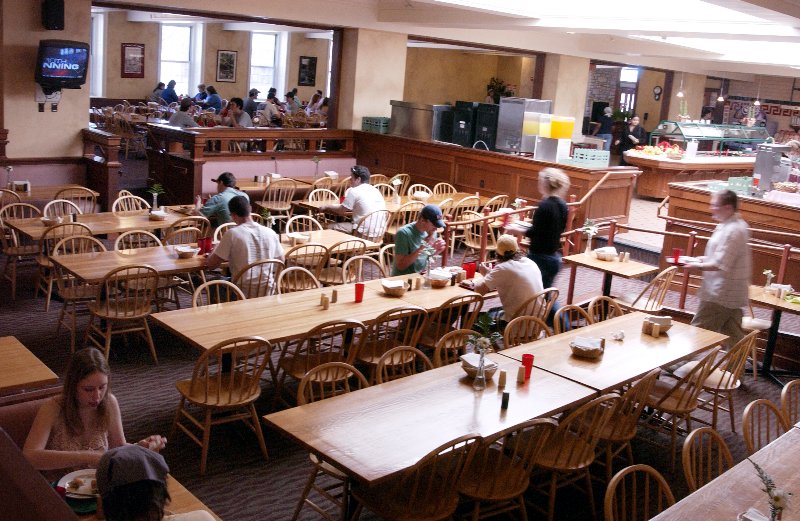St. Lawrence University is in the process of redoing the current meal plan offerings for the upcoming academic school year, 2017-2018. The university has contracted an independent consulting firm that works with colleges on their dining plans.
In June, the consultants be-gan collecting background data on the current meal plan and dining situation on campus. Their charge from the university was to create a new meal plan and look at the implications of the current and future meal plans on the campus community. Specifically, they focused on the degree to which the meal plan fits the needs of the students and the dining facilities.
Currently, there are five different plans being proposed. Each of these plans would cost students the same amount of money. The consulting firm came up with a “Hybrid/Life-style Meal Plan” proposal for SLU. This is a “mix of several models (‘Hybrid’) with greater flexibility and choices offered to older students, reflecting their expectations and needs for more control over where and how they can use their meal plans (‘Lifestyle’).” Basically, this means that as a student gets older, they have more meal plan options avail-able to them. Once they reach senior year, they will be able to choose from any of the offered meal plans. First -years have only one option for meal plans, whereas by senior year, students will be able to choose from five different plans.
One of the big changes that the firm proposed is for Dana Dining Hall to be consistently open throughout the entire day. Instead of open-ing and closing for each meal, Dana will be open from the early morning until the night.
The “Unlimited 7” meal plan will be for all first-year students. This plan gives unlimited access to Dana every day of the week. This plan is very popular at other colleges, because students do not have to count meals or dollars to stay on track with their plans. In addition, students will receive 100 Dining Dollars per semester. These Dining Dollars act like cash and can be used across campus at different satellite venues. Students can use up to 10 take-out meals from Dana per week. If the student chooses to have a take-out meal, they will be locked out of Dana for the remainder of the meal period. Students also have the choice to use up to five exchanges for “meal deals” across campus at other satellite locations. If the student chooses to do this, they will be locked out of Dana for the remainder of the meal period as well.
Sophomores can choose to continue with the “Unlimited 7” plan, but they will also be eligible for the “Weekly 15” plan. With this plan, students will have up to 15 meals per week at Dana. This balance resets at the beginning of each week, so unused meals are forfeited. These meals can either be eaten in Dana or can be take-out. Students will also get 250 Dining Dollars per semester. Just as with the “Unlimited 7” plan, up to five meals per week can be “meal deal” exchanges.
Juniors can either choose from the “Unlimited 7” or “Weekly 15” plans, or the “190 Block” plan that is now available to them. With this plan, 190 meals at Dana can be used throughout the semester. These can be dine-in or take-out. Students will be given 400 Dining Dollars per semester and now can use up to seven meal exchanges per week.

Seniors can choose from any of the above plans, or choose one of the two new plans for which they are eligible. One of these is the “Weekly 7” plan, which is like the “Weekly 15” plan. Students can have up to seven meals per week at Dana, either dine-in or take-out. The balance resets at the beginning of each week. Students receive 1,100 Dining Dollars per semester. With this plan, all seven of the meals per week can be exchanged for “meal deals.” The second plan also available to seniors is the “Declining Balance” plan which is like the present half flex plan. This plan gives a meal bank balance of $1,100, after the overhead fee of $1,500. As with our current plans, the student pays the cash price for either a meal at Dana or a la carte food at satellite locations. This plan is the only plan in which the dollars have the 35% discount at Dana and the 10% discount at the satellite dining venues.

Potential options for Seniors. (Brenda Winn, News Co-Editor)
The university realized the need for a new meal plan primarily because students spend more than they originally paid for their food throughout the campus. Students’ meal plans are not lasting them throughout the semester. “This is the part that is broken, not the food being offered;” the firm has reported. The firm focused on trying to find a way to put out the best food for the least amount of money per plate. SLU gave the firm two goals: to alleviate student dissatisfaction with the meal plan, and to find a way for the university to make more money without raising the price of the meal plans.
A large concern that students have for these proposed plans is that there are going to be too many plans offered. There are also other concerns, specifically related to the amount of traffic that these plans would bring to Dana. During a recent discussion with the consultants about the proposed plans, Sydney Fallone ’17 said that she sees three big issues with using Dana as much as is anticipated. “Three issues I see relate to having even longer lines than there are now in Dana, having too large of a crowd at Dana without enough seats, and the fact that Dana is understaffed as it is, so this would create more of a demand without the workers being able to keep up,” she said.
Thelmo President-elect R. Christopher Di Mezzo ’18 sees many issues as well with the proposed plans. “Particularly, I have concerns about forcing first years to essentially eat solely at Dana. Because SLU fosters inter-year friendships, it is common for first-years to share a meal with older students. With the proposed plans offered here, first-years would have to dictate the venue choice, as their only option would be Dana.” The consultants said that the first-year program is the main concern because they want to encourage these students to eat together, and they want to make Dana a social hangout place where students can do homework together and relax as a group. “I think that [this plan for first-years] hurts the FYP because were on a liberal arts campus where we encourage creativity, but this meal plan would be telling students where they have to eat,” Di Mezzo said.
Di Mezzo also started the conversation with the consulting firm about having current students “grandfathered” in, not forcing them to choose new plans but allowing them to keep their old ones until graduation. Incoming students would be the ones that would use the new plans, as they have never known any differently. “These plans will change the eating culture of campus,” he said. “And with the grandfather option, I think the university will receive less pushback.”There are many concerns and thoughts that students have about the proposed plans, and the consulting firm is diligently noting each of them to consider. The firm does not have to turn their final proposal in until January or February, so there is potential for these plans to change. The ultimate plan that will be implemented will be based off of these proposed plans.



